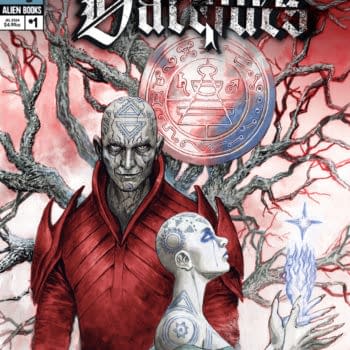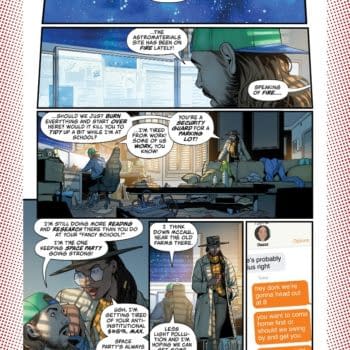Posted in: Comics, Recent Updates | Tagged: batgirl, Comics, dc, oracle, wheelchair
Batgirl And The Legion Of Sadistic Disability Fetishists by Eric Glover

Thinking over three reactions to an article on the Barbara Gordon controversy
About a month ago, I wrote an op-ed on DC Comics' decision to super-glue the severed spinal cord of a paralyzed character and have her skipping on two legs again – "Give Batgirl The Chair". Long story short, I was pretty pissed about it. Although the superhero in question meant a lot to fans as the able-bodied, fearless feminist Batgirl, I drew more significance from her after her retirement as plain old Barbara Gordon, during which the Joker shot her through the spine (the bastard). The fact that DC decided to "cripple the bitch"—yeah, someone actually said that—and crystallize it as canon was obviously a misogynistic low, but what the company decided to do next brought with it some redemptive highs: Ever since 1989, DC has poured massive effort into crafting the former Batgirl into the exceptionally capable Oracle, a woman who's basically run the DC universe (or DCU) from a wheelchair as an information broker and professional badass. But because DC's path to better representation of people with disabilities has always been more "Stairmaster" than "escalator," Oracle has carried a disproportionately high burden of social significance on that controversial back of hers, and I suppose it was inevitable that sooner or later, something had to give.
With DC returning Barbara Gordon's body to near-mint condition starting with Batgirl #1 next month, written by Gail Simone, I thought it crucial my op-ed galvanize an effort against DC's choice, and soon. Once the article was published on Bleeding Cool, it seemed effective at recruiting the choir I was preaching to, but my critique of DC invited its own backlash of criticisms—some of which I should have seen coming, some of which had no business being real:
"I'm pretty sure this was written by the weirdo with e [sic] disability fetish…"
…Okay…
"I'm amazed that somebody would spend that amount of time to write such inanity. Or [sic] we supposed to believe that given a cure someone with a disability, yes a frickin disability, would turn it down because of some bizarre sense of community to fellow cripples? If so, please take your time out of the day to send messages to various medical researchers whose work is clearly the removal of such hindrances in peoples lives and tell them to stop, cause you're doing bad bad things…"
Kinda lost me at "cripples," dude.
"A handicap is a problem to be overcome… And personally, if I was crippled I wouldn't want to read about a cripple, I'd want to read about people who can do things I can't…"
Point was more that people aren't problems to be overcome. And again with the "cripple." What year is this?
It would be misleading to tell you these were the only kinds of comments I got, and equally misleading to tell you they were few and far between. But putting aside those commentators suffering from Keep Spidey White Syndrome—an unfortunate condition that causes everyday people to use demeaning and ignorant language to legitimize their arguments—there were some more level-headed expressions of disagreement put out there. Most often, they could be attributed to one of these three categories:
1) It's kind of sadistic to want Barbara in that chair.
2) Be patient. It's a reboot. DC will put Barbara back in her role with a disability eventually.
3) Leave Gail Simone alone. It wasn't her choice to heal Barbara; it was her bosses'.
So now that we've designated a kids' table…
It never occurred to me that demanding the presence of characters with disabilities would ever be equated with enjoying the pain and difficulty that comes from living with them. You'd think this'd just be a straw man, but I actually received more than one quip either explicitly or implicitly accusing me of sadism, and I guess behind that crude and charged terminology could have been a genuine concern at play: Why keep Oracle disabled? If she were real, wouldn't you want her to live an easier life?
Of course I would, and no one's pretending having a disability doesn't suck sometimes, a lot of the time, or even all of the time. Considering the inconveniences, condescension, medical costs, odd looks from strangers, and the inaccessibility of certain physical or social aspects of community, yeah, I would definitely pull out my inner Jesus and go on a miracle-working rampage, if I could. But as long as cures aren't available for countless disabilities affecting people's entire lives, I think we'd better accept and understand the ones that are sticking around for a while. And, you know, the people living with them.
Because ignoring the existence of those with disabilities in order for "normal" people to feel better–or in the case of this Batgirl thing, more entertained–is inflicting pain on one party for another's sense of pleasure and… Wait, what's the definition of sadism again?
Another part of my article that really didn't take with its more devout naysayers was my association of ability with identity. For some reason, despite the incredible amount of discrimination that people with disabilities have to face as a group on a regular and often daily basis, many of my detractors just couldn't wrap their heads around the fact that disability can sharply influence a person's idea of self, personality, and pride (or lack thereof)—which could explain why someone with a disability might like to see someone who reflects them in their media.
So in honor of the critics who weren't grasping the identity argument, here's the Batgirl controversy wrapped up in more familiar package: race. Imagine, instead of seeing a proportionate percentage of people who look like you on your TV, that only one actor of your skin color has a regular role on any show. Everyone else, on every other program, on every other station, shares another skin color. Every time you change the channel, see a commercial, peek at the extras in the background, they're all the same race. A little weird, right?
Take it a step further. There are occasionally guest appearances of people with your skin color, but their skin tone is almost always changed to the majority's sooner or later. The one character who looks like you is portrayed positively, but remains isolated—and at the back of your mind, you understand that chances are slim this character will look like you forever. Then, one day, the inevitable does happen—and the reason, you're told, is that this character is more accessible to everyone else this way. Besides, this character used to look like everyone else (Why keep Oracle a racial minority? If she were real, wouldn't you want her to live an easier life?).
The analogy's not perfect, but the overlap's still there. Characters with disabilities show up extremely rarely in entertainment, and especially in comics. Until now, readers with disabilities have only had Oracle as the one reliable, prominent character in DC Comics who resembles them. Other characters have been disabled, but usually healed in some way involving advanced technology, magic, or continuity tweaks returning them back to "normal." And now even Oracle has joined the overwhelming mass of able-bodied heroes that already over-represent their real-life counterparts. The logic being that Barbara was able-bodied 20 years ago, and apparently, that's her "truest" version.
The reboot theory
The second big objection I usually get about the article is that it's moot, given that DC's reboot is bringing everyone back to their earlier days, and Barbara is logically being reverted to her pre-paralysis state (even the famous comic book junkie Kevin Smith made this mistake). Except that's it's not a reboot; it's a relaunch. The difference may seem subtle at first, but it becomes more glaring the more you investigate what it means.
A reboot would imply that everything in the DCU is starting from scratch, or something close to it. And by that nature, surely Barbara Gordon will be disabled again at some unspecified time in the future (read: when writers feel like it). Aside from the fact that "probably" isn't good enough for a group that's been systematically marginalized in pop culture—and neither is an indefinite waiting period, for that matter—there's another huge error about this way of thinking: once the relaunch starts, Barbara will have already been Oracle.
The relaunch, when broken down, basically means a reshuffling of character histories, not a restart. So instead of getting a de-aged Barbara too young to be paralyzed just yet, DC is actually tweaking her story so that she was recently shot and temporarily disabled, operating for a short period as Oracle, and now returning to her role as Batgirl. In other words, DC has repositioned Barbara to make Oracle a part of her past, and never again a part of her future.
Even people who agreed with my op-ed had a tough time swallowing the parts that criticized Gail Simone, DC's kick-ass writer extraordinaire. When Newsarama writer Jill Pantozzi called out DC for failing to live up to its promise of diversity after Barbara was announced as able-bodied again, Simone stepped forward and told her side of the story, arguing why the new and healed Barbara could be a good thing for comics.
And here's the thing: she nailed it. Simone is known for not only being an exceptional writer, but also a wonderful person, and she came off no less true to her reputation during her interview with Pantozzi. Her points were compelling and her sentiment sincere, leaving very little to be said in rebuttal once the interview was over.
So naturally, my own article—and the campaign it was supposed to support—would have been a joke if I hadn't addressed Simone's extremely sound arguments. If I was going to raise any hell about why healing Barbara was an unethical move on DC's part, I had to address every aspect of Simone's well-articulated points, or the op-ed would have hit the ground dying. Because Simone occupied so much of my article, several readers misunderstood my words to mean I was out for her blood—or at least blamed her more than I did DC's higher-ups. In truth, Simone's well-intentioned explanations were the only justifications offered by DC at the time, in any capacity, and ignoring them for the sake of "sparing Gail" would have been a shot in my own foot.
Besides, as amazing as Simone is, she didn't have to take on Batgirl. But because she chose to, I'm sure she understands the responsibilities that come with her controversial decision, and the sadistic wheelchair fetishists out there who were bound to come her way.
Visit the Barbara's Not Broken Facebook cause page to take a stand against DC's decision.
Photo courtesy of DC Comics/Barbara's Not Broken, Originally posted at The Faster Times.














